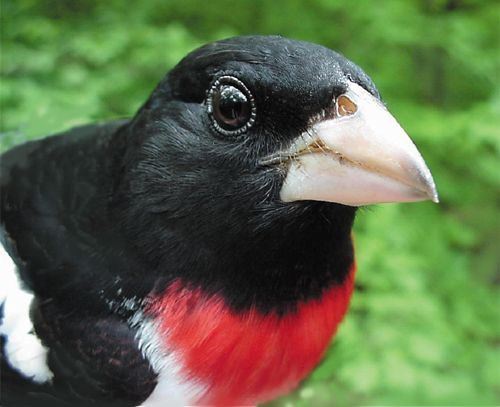
Birdwise, the talk-of-the-town for the past few weeks has been the rose-breasted grosbeak.
Numerous calls from observers who have seen this spectacular bird at their feeders have come from Evans, Martinez, Augusta, North Augusta, Aiken, Beech Island, Langley and other Central Savannah River Area towns. This bird is a 'knock-out' and when you see him for the first time you are dazzled by his beauty.
On their way to northern nesting grounds in the spring, a scattering of a flock drops down to feed and rest all along the route and only a small number is seen each spring. However, when there are numerous spring storms producing rain, hail and wind, migrating birds will come to rest because they can't battle such forces in flight. This will lead to an unusually large influx of birds.
Finding themselves in a new territory, one in which there is plenty of natural food and gobs of bird feeders, they linger awhile, enjoying the warm weather and other amenities of the deep South. From wintering in Central America, the rose-breasted grosbeak arrives in this region from mid-April through early May in a striking new spring and summer suit. The male is handsomely garbed in black and white with a patch of the loveliest bright re-rose on his snow white breast and the most delicate of pink linings on the underside of his wings. The only fault that can be found in the beauty of this feathered Beau Brummell is his big over-sized nose. It seems to overwhelm his black face.
The dowdy lady grosbeak in her streaked dress of brown and grayish white resembles a puffed-up sparrow. She has not a rose-colored feather on her. White eyebrows are noticeable and her bill is thick and exaggerated like her mate's. Her size (eight inches) and big pale bill distinguish her from the sparrows. She wears the same dress the year 'round. No new styles for her.
Rose-breasted grosbeaks do not nest in our area and they are not common residents until you get "way up north" or, occasionally, in the mountains of Georgia and South Carolina.
His song is not unlike that of the robin and we sometimes mistake it for the scarlet tanager, another migrant. You must go to his breeding grounds to hear him, for seldom does he sing on migration.
In fall migration, when these elegant birds return through the area, usually the male still will be wearing his resplendent black and rose dress. As the year advances and he travels to the tropics, he will change outfits.
Changing his dressy duds to an outfit more like the female's, he keeps a tinge of rose on his breast and black and white on his dowdy wings. These small bright spots will distinguish the two.
If you want to attract these birds this fall and in the spring, keep your tabletop feeders filled with sunflower and safflower seeds. A tired migrating grosbeak will thank you, maybe in song, but always in beauty, for easy access to food.
